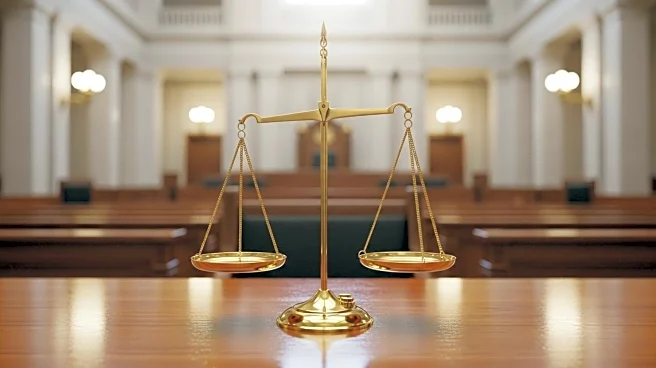What is the story about?
What's Happening?
The U.S. Supreme Court is set to review a significant case involving tariffs imposed by President Trump, which could have substantial economic implications. The case challenges the authority of the President to levy tariffs under the 1977 International Emergency Economic Powers Act (IEEPA), a law that does not explicitly mention tariffs. President Trump has used this act to impose import duties of at least 10% on all U.S. trading partners, citing emergencies such as fentanyl smuggling and high trade deficits. The case has been brought forward by a coalition of Democrat-led states, small businesses, and private companies, arguing that the President overstepped his authority, which traditionally resides with Congress. The Supreme Court's decision could either uphold or challenge the President's ability to use tariffs as a tool for economic strategy.
Why It's Important?
The outcome of this case holds significant implications for U.S. economic policy and international trade relations. If the Supreme Court sides with President Trump, it would affirm the executive branch's ability to unilaterally impose tariffs, potentially altering the balance of power between Congress and the President regarding trade policy. This could lead to increased import duties, affecting the cost of goods and services and impacting businesses and consumers across the nation. Conversely, a ruling against the President could reinforce Congressional authority over trade and taxation, potentially leading to a rollback of the tariffs and a shift in trade negotiations. The decision will influence the economic landscape, affecting trillions of dollars in international trade.
What's Next?
The Supreme Court has agreed to consider the tariff challenge on an expedited schedule, indicating the urgency and importance of the matter. Should the court rule in favor of President Trump, it would solidify the current tariff regime, at least temporarily, and could lead to further executive actions in trade policy. However, if the court rules against the President, it may necessitate a reevaluation of current tariffs and trade agreements, potentially involving Congress more directly in future trade negotiations. Stakeholders, including businesses, trade partners, and policymakers, are closely monitoring the case for its potential impact on the U.S. economy and global trade dynamics.
Beyond the Headlines
The case raises broader questions about the scope of presidential powers and the interpretation of emergency economic measures. It highlights the tension between executive authority and legislative oversight in shaping U.S. trade policy. The legal arguments focus on the interpretation of the IEEPA and its application to tariffs, which could set a precedent for future administrations. Additionally, the case underscores the complexities of using trade policy as a tool for addressing non-economic issues, such as drug smuggling, and the challenges of balancing national security concerns with economic interests.














